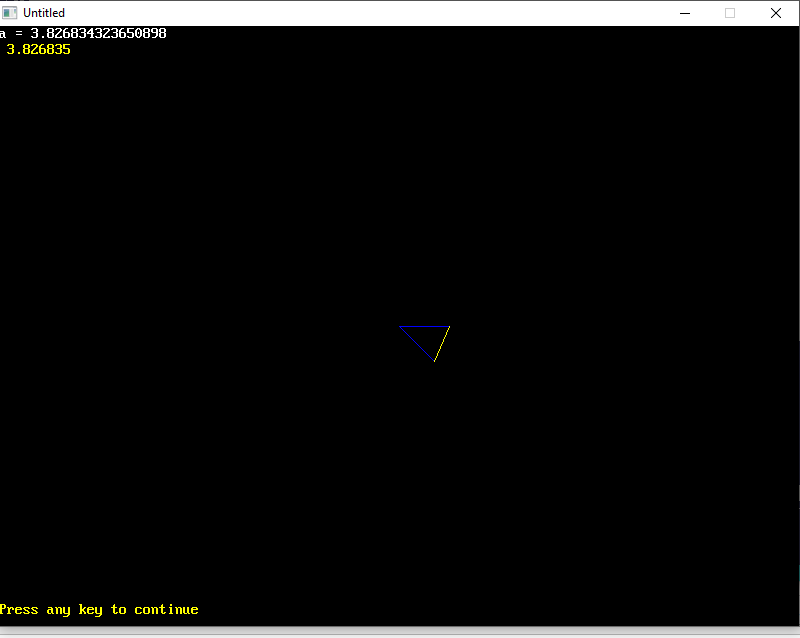Posts: 701
Threads: 106
Joined: Apr 2022
Reputation:
26
11-16-2022, 12:30 AM
(This post was last modified: 11-16-2022, 12:35 AM by PhilOfPerth.
Edit Reason: clarifying
)
One for the Math (or ”outside-the-box-thinking”) gurus:
Given an isoscles triangle ABC, with sides b and c (the sides opposite B and C) both 5 units in length, and with angle A=45degrees, is there a (simple?) way to find the length of side a, without resorting to pre-determined trig tables like sin, cos and tan, or pi?
The reason I don’t want to use these is I’m trying to demonstrate how pi relates to the circumference of a circle, so I don’t want to involve anything that relies on pi – that would be “bootstrapping”, sort of like lifting oneself up by the bootlaces.
Of all the places on Earth, and all the planets in the Universe, I'd rather live here (Perth, Western Australia.) 
Please visit my Website at: http://oldendayskids.blogspot.com/
Posts: 3,001
Threads: 356
Joined: Apr 2022
Reputation:
280
Sure. In this case, it's the simple old a ^ 2 + b^ 2 = c ^2 formula
5 ^ 2 + 5 ^ 2 = c ^ 2
25 + 25 = c ^ 2
SQR(50) = c
7.07 = c
(OR in this case you can also remember the old ratio for 45% triangles... 1 to 1 to SQR(2).  )
Posts: 2,566
Threads: 263
Joined: Apr 2022
Reputation:
138
11-16-2022, 01:08 AM
(This post was last modified: 11-16-2022, 01:20 AM by Pete.)
To me it looks like you are describing a pyramid shape triangle. 45 degree angle tot he top. Pop a line down the center and you get two right triangles, each with a hypotenuse of 5 unites. Now right triangles you can plug that into the Pythagorean Theorem then you should be good to go.
Just did the math..
3.53553 = 5√2/2 and just multiply by 2 = 7 .07106
Pete
When Steve and I agree, the poles generally shif..........................................t
Posts: 3,001
Threads: 356
Joined: Apr 2022
Reputation:
280
Or, if I read the problem wrong (as it seems Pete and I have two different interpertations of the problem), you might want:
Formula for the Base of an Isosceles Triangle
If you know the side length and height of an isosceles triangle, you can find the base of the triangle using this formula:
b = SQR(a ^ 2 - h ^ 2), where a is the length of a side and h is the height.
how to find the third side of a triangle: formula for the base of an isosceles triangle
where a is the length of one of the two known, equivalent sides of the isosceles.
Posts: 2,566
Threads: 263
Joined: Apr 2022
Reputation:
138
Or Screw the triangle and try and find the volume of a cone. I just pour out the ice cream into a measuring cup, and wait until it melts to measure that.
Pete
Posts: 4,123
Threads: 190
Joined: Apr 2022
Reputation:
258
11-16-2022, 01:29 AM
(This post was last modified: 11-16-2022, 02:00 AM by bplus.)
I get this:
'45 /2 = 22.5
'sin(_d2r(22.5) = a/5 ' Update: actually (1/2 of a) /5 = sin(22.5 degrees)
Print "a ="; 2 * (5 * Sin(_D2R(22.5))) ' 3.8268...
The only way you might avoid a trig table is if you can somehow use the fact that 22.5 is 1/3 of 67.5 the base angles of the iso tri.
My trig not that good.
Here it is illustrated in QB64pe:
Code: (Select All) Screen _NewImage(800, 600, 32)
'45 /2 = 22.5
'sin(_d2r(22.5) = a/5
Print "a ="; 2 * (5 * Sin(_D2R(22.5))) ' 3.8268...
'draw scale model
xc = 400: yc = 300 ' center of screen
scale = 10
radius = 5 * scale
x1 = xc + radius * Cos(0): y1 = yc + radius * Sin(0)
x2 = xc + radius * Cos(_D2R(45)): y2 = yc + radius * Sin(_D2R(45))
Line (xc, yc)-(x1, y1), &HFF0000FF
Line (xc, yc)-(x2, y2), &HFF0000FF
Color &HFFFFFF00
Line (x1, y1)-(x2, y2),
dist = Sqr((x1 - x2) ^ 2 + (y1 - y2) ^ 2)
Print dist / scale

b = b + ...
Posts: 2,566
Threads: 263
Joined: Apr 2022
Reputation:
138
Trig? Hey this look like a job for triggered! You know I once asked Bill, Hey Bill, if a boson farts in the forest, but no one is there to observe it, does anyone really give a squark? I still haven't head back. 
Pete
Shoot first and shoot people who ask questions, later.
Posts: 4,123
Threads: 190
Joined: Apr 2022
Reputation:
258
11-16-2022, 02:17 AM
(This post was last modified: 11-16-2022, 02:18 AM by bplus.)
b = b + ...
Posts: 701
Threads: 106
Joined: Apr 2022
Reputation:
26
(11-16-2022, 01:06 AM)SMcNeill Wrote: Sure. In this case, it's the simple old a ^ 2 + b^ 2 = c ^2 formula
5 ^ 2 + 5 ^ 2 = c ^ 2
25 + 25 = c ^ 2
SQR(50) = c
7.07 = c
(OR in this case you can also remember the old ratio for 45% triangles... 1 to 1 to SQR(2).  ) ) But that doesn't account for the angle; if A is wide, side a will be large, but if A is narrow, side a will be small. 
Of all the places on Earth, and all the planets in the Universe, I'd rather live here (Perth, Western Australia.) 
Please visit my Website at: http://oldendayskids.blogspot.com/
Posts: 4,123
Threads: 190
Joined: Apr 2022
Reputation:
258
|







 )
)

